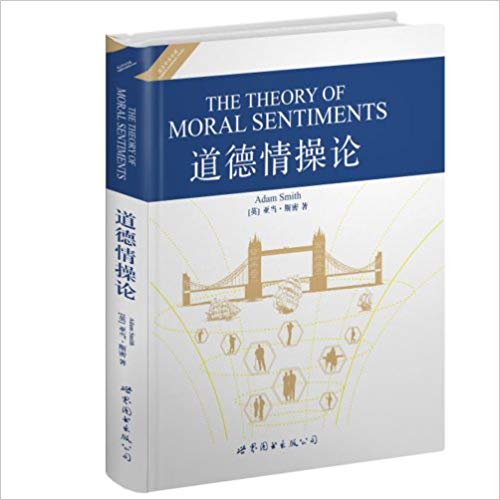
在《英文学术名著:道德情操论》中,斯密继承了以《沉思录》为代表的斯多葛学派的道德哲学思想,把“内心平静”而不是“物质享乐”看作人生幸福的重要标志,将人性中利他和利己这两种本性有机地结合在一起,为之后出版的《国富论》奠定了道德哲学的基础。《道德情操论》相比《?富论》给西方世界带来的影响更为深远,它对于促进人类福利这一更大的社会目的起到了更为基本的作用,是市场经济良性运行不可或缺的“圣经”,堪称西方世界的《论语》。 作者简介
作者:(英国)斯密
目录1 Part I
1.1 Of the Sense of Propriety
1.1.1 Of Sympathy
1.1.2 Of the Pleasure of mutual Sympathy
1.1.3 Of the Manner in which we judge of the Propriety or Im-
propriety of the Affections of other Men, by their concord
or dissonance with out own
1.1.4 The same Subject continued
1.1.5 Of the amiable and respectable Virtues
1.2 Of the Degrees of the different Passions which are consistent with Propriety
1.2.1 Of the Passions which take their origin from the Body
1.2.2 Of those Passions which take their origin from a partic-ular turn or habit of the Imagination
1.2.3 Of the Unsocial Passions
1.2.4 Of the Social Passions
1.2.5 Of the Selfish Passions
1.3 Of the Effects of Prosperity and Adversity upon the Judgment
of Mankind with regard to the Propriety of Action; and 'why it
is more easy to obtain their Approbation in the one state than
in the other
1.3.1 That though our sympathy with Sorrow is generally a
more lively sensation than our sympathy with Joy, it
commonly falls much more short of the violence of what
is naturally felt by the person principally concerned
1.3.2 Of the origin of Ambition, and of the distinction of Ranks
1.3.3 Of the corruption of our Moral Sentiments, which is oc-
casioned by this disposition to admire the rich and the
great, and to despise or neglect persons of poor and mean
condition
2 Part II
2.1 Of the Sense of Merit and Demerit
2.1.1 That whatever appears to be the proper object of grat-
itude, appears to deserve reward; and that, in the same
manner, whatever appears to be the proper object of resentment appears to deserve punishment
2.1.2 Of the proper Objects of Gratitude and Resentment
2.1.3 That where there is no approbation of the conduct of the
person who confers the benefit, there is little sympathy,
with the gratitude of him who receives it; and that, on the
contrary, where there is no disapprobation of the motives
of the person who does the mischief, there is no sort of
sympathy with the resentment of him who suffers it
2.1.4 Recapitulation of the foregoing Chapters
2.1.5 The Analysis of the Sense of Merit and Demerit
2.2 Of Justice and Beneficence
2.2.1 Comparison of those two Virtues
2.2.2. Of the sense of Justice, of Remorse, and of the conscious-
ness of Merit
2.2.3 Of the utility of this constitution of Nature
2.3 Of the Influence of Fortune upon the Sentiments of Mankind,
with regard to the Merit or Demerit of Actions
2.3.1 Of the Causes of this Influence of Fortune
2.3.2 Of the Extent of this Influence of Fortune
2.3.3 Of the final cause of this Irregularity of Sentiments
3 Part III
3.1 Of the Principle of Self-approbation and of Self-disapprobation
3.2 Of the love of Praise, and of that of Praise-worthiness; and of the dread of Blame,
and of that of Blame-worthiness
3.3 Of the Influences and Authority of Conscience
3.4 Of the Nature of Self-deceit, and of the Origin and Use of general Rules
3.5 Of the Influence and Authority of the general Rules of Morality,
and that they are justly regarded as the Laws of the Deity
3.6 In what cases the Sense of Duty ought to be the sole Principle
of our Conduct; and in what cases it ought to concur with other
Motives
4 Part IV
4.1 Of the Beauty which the Appearance of Utility bestows upon
all the Productions of Art, and of the extensive Influence of this
Species of Beauty
4.2 Of the Beauty which the Appearance of Utility bestows upon
the Characters and Actions of Men; and how far the Perception
of this Beauty may be regarded as one of the original Principles
of Approbation
5 Part V
5.1 Of the Influence of Custom and Fashion upon our notions of
Beauty and Deformity
5.2 Of the Influence of Custom and Fashion upon Moral Sentiments
6 Part VI
6.1 Of the Character of the Individual, so far as it affects his own
Happiness; or of Prudence
6.2 Of the Character of the Individual, so far as it can affect the
Happiness of other People
6.2.1 Of the Order in which Individuals are recommended by
Nature to our care and attention
6.2.2 Of the Order in which Societies are by nature recommended to our Beneficence
6.2.3 Of Universal Benevolence
6.3 Of Self-command
7 Part VII
7.1 Of the Questions which ought to be examined in a Theory of
Moral Sentiments
7.2 Of the different Accounts which have been given of the Nature of Virtue
7.2.1 Of those Systems which make Virtue consist in Propriety
7.2.2 Of those Systems which make Virtue consist in Prudence
7.2.3 Of those Systems which make Virtue consist in Benevolence
7.2.4 Of Licentious Systems
7.3 Of the Different Systems which have been Formed Concerning
the Principle of Approbation
7.3.1 Of those Systems which deduce the Principle of Approbation from Self-love
7.3.2 Of those Systems which make Reason the Principle of Approbation
7.3.3 Of those Systems which make Sentiment the Principle of Approbation
7.4 Of the Manner in which different Authors have treated of the
practical Rules of Morality
网友对道德情操论(英文全本)的评论
这是我见过的排版最差的一本书,连正常的页边距都没有,字体基本就贴着书的最边缘,还是斜的,与书边还不平行。
字体是最小的字体,密密麻麻,再加上纸张质量极差,还透着反面页的字,一本几乎无法阅读的书,一收到就想仍垃圾桶。
已经买了电子版,觉得想反复看,想方便点,特意买了纸质版,结果,书差到实在不可看,还不如看电子版。
另外,书的内容跟盗版的似的,里面无数个句号后面的句子是小写开头,而且句子结构还不完整,内容编辑有严重问题。
读了部分文字,刚开始看,对语言方式还不太习惯,往后看下去应该就会好起来。
快递方面,11号下单,预计13号到。然后,13号下雨,下午4点差不多已经在当地货运站,直接电话派件员,回复说下午没回货运站取件只能明天送,听他的电话中环境也是在室内,估计翘班;电话货运站,回复已经派件了啊,要不你再和派件员联系下?我无语,就回了句那我5点下班今天肯定来不及明天算了。电话那边:顾客要求推迟,那我们安排明天配送。我无语。挂了电话没几分钟,亚马逊短信:按您要求,推迟配送。我XXX
虽然我还是喜欢卓越亚马逊的,并且认为配送差个一天也不是问题,只是体验有点糟糕,最后是活生生地“被安排”配送的啊。。。
比翻译版的好,值得一看的经典
没有想象中的好,书皮居然有褶皱,
非常满意,经典之作。
名著啊,,作者的语言功底非常好。
书不错,全英文得好好看了,但排版的这个字体个人不是太喜欢
第一次网上买书,这本性价比很高啊
英文学术名著:道德情操论
全新商品,硬质封皮,纸质良好,携带方便,是一款值得购买的商品。
喜欢道德情操论(英文全本)请与您的朋友分享,由于版权原因,读书人网不提供图书下载服务